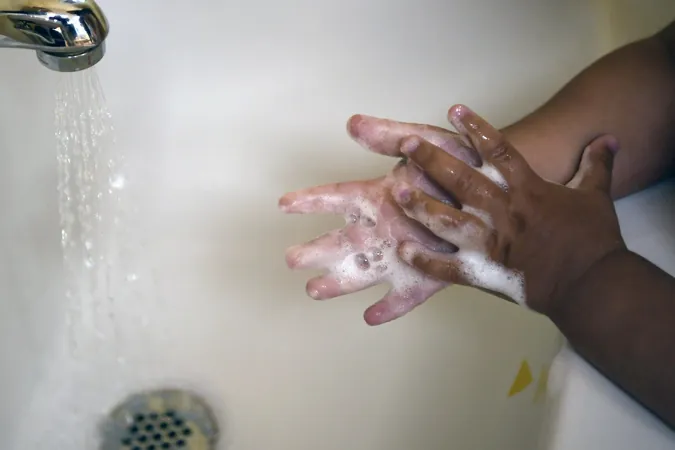
Stay Healthy This Winter: Your Ultimate Guide to Beating Norovirus, COVID-19, Flu, and RSV!
2025-01-11
Author: Mei
Understanding the Culprits: Symptoms and Differences
With several illnesses presenting similar symptoms, knowing what to look for can help you identify what you might be dealing with.
- **Norovirus**: This foodborne illness is notorious for causing sudden bouts of vomiting, diarrhea, nausea, and stomach pain, usually lasting between one to three days. It spreads easily through contaminated food, water, and surfaces.
- **Common Cold**: Caused by various viruses, cold symptoms include a runny nose, congestion, coughing, sneezing, sore throat, and mild fever, generally lasting less than a week.
- **Flu (Influenza)**: Symptoms appear suddenly and can be severe, including high fever, chills, body aches, fatigue, and sore throat. Flu symptoms typically last for several days to two weeks.
- **COVID-19**: This virus can cause fever, fatigue, cough, and even loss of taste or smell. It varies widely in its severity and can last for several days.
- **RSV (Respiratory Syncytial Virus)**: Particularly affecting children, RSV may cause symptoms like congestion, wheezing, coughing, and fever, usually lasting one to two weeks.
Key Preventative Measures You Can Take!
One of the most effective ways to fend off these viruses is through **proper hand hygiene**! Washing your hands rigorously with soap for at least 20 seconds is crucial, especially after using the bathroom or handling food. If soap and water aren’t available, a hand sanitizer with at least 60% alcohol can be your second line of defense — although keep in mind it is not entirely effective against norovirus.
Keep Surfaces Clean
Surfaces can harbor germs, especially after exposure to a sick person. Cleaning high-touch areas like doorknobs and countertops with a disinfectant is essential. For norovirus, use a bleach solution or EPA-registered disinfectant to eliminate the virus effectively.
Personal Contact Etiquette
As respiratory viruses are airborne, it's vital to minimize contact. Cover your mouth and nose when sneezing or coughing, and consider wearing a medical-grade mask in crowded places. Avoid touching your face — this simple practice can drastically reduce your chances of getting sick.
Get Vaccinated!
Vaccination can be a game-changer. Updated COVID-19 vaccines and annual flu shots are available for nearly everyone. Specific groups, such as older adults or pregnant individuals, may benefit from the RSV vaccine. Unfortunately, no vaccines currently exist for norovirus or the common cold, emphasizing the importance of other preventative measures.
Rest and Hydration Are Key
Your immune system requires proper rest and hydration to function optimally. If you’re feeling under the weather, remain hydrated and get plenty of sleep to aid recovery. Dehydration can become a serious risk, particularly with norovirus, so consuming liquids is crucial.
If You Get Sick, Take Action!
Should you fall ill, timely testing can confirm whether you have COVID-19 or the flu, allowing you to access antiviral medications such as Paxlovid or Tamiflu. Most importantly, stay home to prevent spreading the virus to others.
Treatment Tips: Comfort and Care
For the common cold and flu, rest and hydration are critical. Over-the-counter pain relievers can help ease symptoms. In cases of norovirus, rehydration through fluids is essential. Seek medical attention if dehydration concerns arise.
Remember, awareness and precaution are your best tools this winter to navigate the rampant illness season. Stay informed, stay healthy, and protect yourself and your loved ones!
 Brasil (PT)
Brasil (PT)
 Canada (EN)
Canada (EN)
 Chile (ES)
Chile (ES)
 Česko (CS)
Česko (CS)
 대한민국 (KO)
대한민국 (KO)
 España (ES)
España (ES)
 France (FR)
France (FR)
 Hong Kong (EN)
Hong Kong (EN)
 Italia (IT)
Italia (IT)
 日本 (JA)
日本 (JA)
 Magyarország (HU)
Magyarország (HU)
 Norge (NO)
Norge (NO)
 Polska (PL)
Polska (PL)
 Schweiz (DE)
Schweiz (DE)
 Singapore (EN)
Singapore (EN)
 Sverige (SV)
Sverige (SV)
 Suomi (FI)
Suomi (FI)
 Türkiye (TR)
Türkiye (TR)
 الإمارات العربية المتحدة (AR)
الإمارات العربية المتحدة (AR)